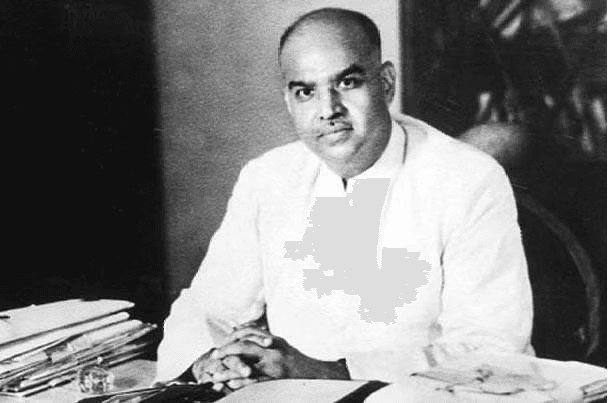Dr. Shyama Prasad Mukherjee

Early Life and Education
Dr. Shyama Prasad Mukherjee was born on 6 July 1901 in Kolkata, West Bengal, into a prominent Brahmin family. His father, Ashutosh Mukherjee, was a renowned educator and the Vice Chancellor of Calcutta University, while his mother, Jogmaya Devi, was a learned and supportive figure in his life. Shyama Prasad was a brilliant student, excelling in his studies from a young age. He attended the prestigious Presidency College in Kolkata and later studied at the University of Cambridge, where he earned his degree in History. He also went to the University of Berlin to further his education. His academic brilliance and interest in social issues laid the foundation for his future political career.
Early Political Engagement
Mukherjee’s involvement in politics began in his early years. Inspired by the freedom struggle, he joined the All India Hindu Mahasabha, a right-wing nationalist organization. He was deeply concerned about the growing political divide between Hindus and Muslims in the country, particularly after the partition of Bengal in 1905. His belief in Hindu unity, the preservation of culture, and the importance of national sovereignty shaped his political ideology. He became an active participant in the Indian National Congress but eventually distanced himself due to ideological differences, particularly regarding the partition of India. Mukherjee opposed the idea of dividing the country along religious lines.
Role in the Indian National Congress
Shyama Prasad Mukherjee joined the Indian National Congress in the 1920s and worked closely with leaders like Jawaharlal Nehru and Subhas Chandra Bose. He quickly rose to prominence in Congress for his intellectual contributions and passion for national unity. His initial focus was on social reforms and addressing the concerns of the Indian middle class. However, his views began to diverge from Congress leadership, particularly on the issue of partition and the handling of Muslim separatism. He was critical of Mahatma Gandhi’s appeasement of Muslim leaders and the Congress’ approach to Muslim-majority areas. These differences led to his eventual departure from the Congress in the 1930s.

Founding of the Bharatiya Janata Party’s Predecessor
In 1947, after India gained independence, Shyama Prasad Mukherjee became the first Minister for Industry and Supply in Jawaharlal Nehru’s cabinet. However, his tenure was short-lived as he resigned in 1950 in protest against Nehru’s policies towards Jammu and Kashmir. Mukherjee was staunchly opposed to Article 370, which granted special autonomy to Jammu and Kashmir. His ideology led him to found the Bharatiya Janata Party’s predecessor, the Jana Sangh, in 1951. He envisioned a party that would unite Hindus, promote nationalism, and safeguard the unity of India. Mukherjee’s efforts were critical in setting the foundation for the party’s future role in Indian politics.
Opposition to the Nehru Government and Kashmir Issue
Shyama Prasad Mukherjee was vocal in his opposition to the Nehru government’s handling of Jammu and Kashmir, particularly regarding the special status of the state under Article 370. He strongly opposed the idea of a separate constitution for Jammu and Kashmir and believed that this special status was detrimental to the unity of India. In 1953, Mukherjee famously led a protest march to Jammu and Kashmir without obtaining the required permit, and he was arrested by the Kashmir police. His arrest and subsequent imprisonment led to a nationwide outcry, and he became a symbol of resistance against the Congress-led government. His stance on Kashmir earned him both admiration and criticism, and he remained a staunch advocate for the integration of Jammu and Kashmir into the Indian Union.
Sudden Death and Legacy
Shyama Prasad Mukherjee’s life was cut short when he died on 23 June 1953, under mysterious circumstances, while in custody in Srinagar, Kashmir. Officially, his death was attributed to a heart attack, but there have been various speculations regarding the true cause, with some claiming that he was deliberately targeted by political adversaries. His untimely death shocked the nation and left a void in Indian politics, particularly for the Hindu nationalist movement. Mukherjee’s contributions to India’s political landscape, especially his role in the formation of the Jana Sangh and his relentless efforts for national integration, have left an indelible mark on India’s history.
Lasting Influence
Shyama Prasad Mukherjee’s legacy continues to influence Indian politics today. He is remembered for his unwavering commitment to nationalism, secularism, and the unity of India. His opposition to the partition of India and his efforts to integrate Jammu and Kashmir into the Indian Union were pivotal in shaping India’s political future. Today, his vision is reflected in the Bharatiya Janata Party (BJP), which continues to carry forward his principles of nationalism and unity. Various statues, memorials, and institutions are dedicated to his memory, and his life remains a source of inspiration for political leaders and nationalists alike.
